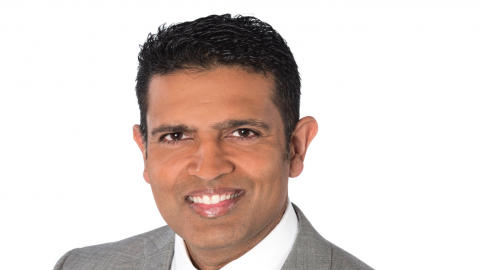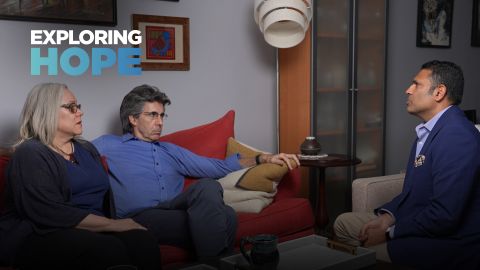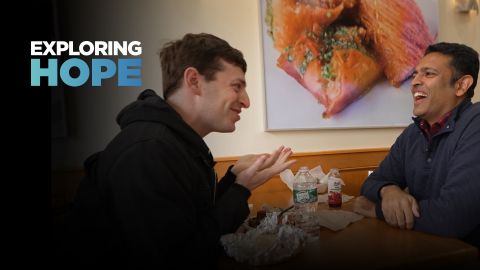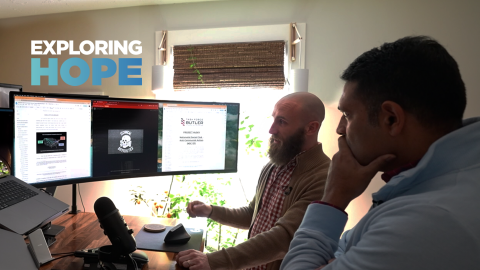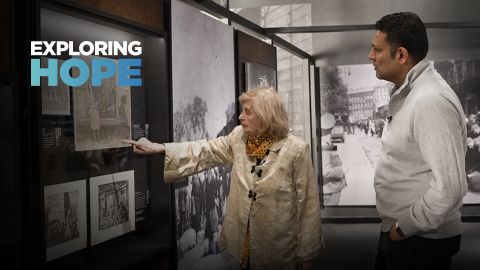VIDHYA RAMALINGAM: I run a company called Moonshot. And we deal with countering hate and violence and extremism online.
HARI SREENIVASAN: Vidhya Ramalingam founded Moonshot in 2015. She’s hoping her company will achieve a monumental goal: ending online hate and extremism through empathy and mental health support.
VIDHYA RAMALINGAM: I got into this through maybe a non-traditional path. I had trained as an anthropologist, that was my undergraduate degree. I was looking at people who are getting involved in white supremacist movements and hate movements. And I thought, well, who’s actually going to talk to those people? I started attending white nationalist rallies. That was my starting point I just started turning up at events. And I would stand in the back at first until I built up the courage to actually go up to people and ask them questions and start talking to them. I wanted to know who they were, how they ended up in this worldview, what they were hoping to achieve. It was a very strange experience and not an easy one, I think especially as a woman of color being in an environment where you’re constantly surrounded by hate.
VIDHYA RAMALINGAM: And I wouldn’t say that I sympathized with them at all. But I started to empathize a little bit with how someone who had experienced everything in their lives might end up in this situation where they believed what they believed. And I think, actually, that moment of humanizing the other for me, you know, they were the other for me, they were people who I thought were monsters. And all of a sudden, I started to see them as human beings, with sometimes actually very rational journeys into into hate. And that for me, a light bulb went off because I thought, okay, actually, if I can understand how someone could go down this path, then there’s a chance at actually starting to understand when, when there might be moments where you could intervene.
VIDHYA RAMALINGAM: And so what we’re doing is trying to ensure anyone online who is interacting with hate, who’s engaging with hate, who’s seeking it out proactively, that they are always offered a safer alternative.
HARI SREENIVASAN: Moonshot developed an approach called “the Redirect method”: using ads to steer online searches for hate to safer content.
HARI SREENIVASAN: So, if I’m searching for a car on Google, there’s going to be a bunch of car companies trying to advertise to me, if I’m searching for how to be a white nationalist, or something hateful, what is a likely ad that I’m going to see?
VIDHYA RAMALINGAM: So we ran ads that tested messages asking whether people were feeling angry, we tested ads, where we asked them, are you feeling lonely? And we also tested ads asking, are you feeling isolated? They were by far and away the most effective ads that we ran as compared to every other ad that we tested trying different messaging tactics. Once you get someone to actually click on the ad, the next step is to actually try and get them to engage with the service.
HARI SREENIVASAN: In 2021 Moonshot estimates they disrupted more than forty thousand searches for dangerous content… leading to hundreds of one to one messages with at risk users.
HARI SREENIVASAN: So, what’s interesting to me is that you’re not trying to change their mind, per se, about what they’re looking for.
VIDHYA RAMALINGAM: We are not here to be the Thought Police, we’re not here to tell people what they should or shouldn’t believe. This is just about understanding that if someone is engaging with incredibly violent content online, or content that is affiliated with movements that incite violence, that we want to ensure they have the opportunity to talk to someone.
HARI SREENIVASAN: Have you seen patterns in the work that you’ve done with what happens online after a real-world incident?
VIDHYA RAMALINGAM: After every incident that has happened in the US over the last 5 to 7 years, we always see a spike in engagement with hate content. I’ll go back for a moment to 2017, when Charlottesville happened. We tracked in the days immediately following the Charlottesville attack, a 400 percent increase in attempts to access white supremacy content. Over the last six years, we’ve tracked after almost every violent incident, we track a similar spike in activity. And what really worries me about that is, you know, we don’t necessarily always go back to the original baseline year on year we’re seeing escalations in this, in attempts to access this content and the sharing and posting of this content. And that’s what worries me the most because we’re seeing a kind of overall escalation year on year. As of 2023 there’s no longer this divide between the online and the offline space, right? We all live and exist in both worlds. And I think for far too long, long, we’ve seen, you know, we’ve used terms like keyboard warriors and talked about the digital space as if it’s completely divorced from reality, behind all of those data points online are human beings. And we have to get at the human problem if we’re ever going to deal with this.
HARI SREENIVASAN: So what is it that you’ve learned if you can distill? Are there any commonalities? Are there any similarities, whether you’re working in Indonesia, or whether you’re working in Indianapolis, about what drives people down these paths?
VIDHYA RAMALINGAM: You know, I’ve spent my whole career working sometimes directly with people who are going down extremist paths, and sometimes with people who have turned their lives around and now have left. You know, while there’s no one story, there’s no one path into extremism, the common theme, and the common thread that really has stood out to me over the years is, in almost every case, there’s this desire to belong, to be a part of something, this need to be a part of something that’s greater than themselves. And you can add whatever layer on top of that in terms of ideology and the rationale. But ultimately, when you distill it down, it’s about this emotional desire to be a part of something to belong and to be a part of something greater than oneself.
VIDHYA RAMALINGAM: We need to be reaching people with something that they can not only engage with online, but potentially even offline, something they can engage with in the long run something that will actually, you know, help them turn their lives around. And that’s a long-term journey, not one that will happen overnight.

